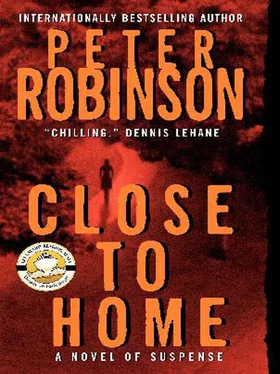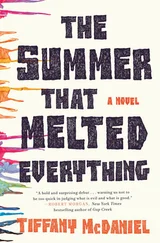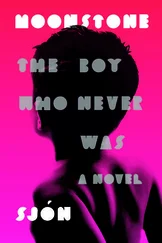Josie looked at Banks, uncertain.
“DI Cabbot’s right,” he said. “All bets are off when it’s murder. Who was this friend?”
“Just someone I saw him with, that’s all.”
“Where?”
“In Eastvale. Swainsdale Centre.”
“When?”
“Recently.”
“Past week or two?”
“A bit longer.”
“A month?”
“Aye, about that.”
“How old? His age? Older? Younger?”
“Older. She wasn’t no fifteen-year-old, I can tell you that.”
“How old?”
“Hard to say when they’re that age.”
“What age?”
“Young woman.”
“How young? Late teens, early twenties?”
“Aye, around that.”
“Taller or shorter than him?”
“Shorter. Luke were a big lad for his age. Tall and skinny.”
“What did she look like?”
“Dark.”
“You mean she was black?”
“No, her skin was pale. She just dressed dark, like him.
And her hair was dyed black. She had red lipstick on and them studs and chains all over t’place. And she had a tattoo,” she added in a hushed tone, as if saving the greatest sin for last.
Banks glanced at Annie who, he happened to know from experience, had a butterfly tattoo just above her right breast. Annie gave him a look. “Where?” she asked Josie.
Josie touched her upper left arm, just below the shoulder. “There,” she said. “She was wearing one of them leather waistcoats over a T-shirt.”
“What was the tattoo?” Annie asked her.
“Couldn’t tell,” said Josie. “Too far away. I could just see there was a mark, like.”
This woman shouldn’t be too difficult to find if she lived in or near Eastvale, Banks thought. It was hardly Leeds or Manchester when it came to girls in black with studs, chains and tattoos. There was only one club, The Bar None, which catered to such a crowd, and then only two nights a week, the rest of the time being reserved for the techno-dance set. It was possible she was a student at the college, too, he thought. “Would you mind if we sent a sketch artist over to work on an impression with you this afternoon?” he asked.
“I suppose not,” said Josie. “If Sir and Madam don’t mind, like. Only I’m supposed to be doing t’upstairs.”
Banks looked at her. “I don’t think Mr. and Mrs. Armitage will mind,” he said.
“All right, then. But I can’t promise owt. Like I said, I didn’t get a close look.”
“Can you tell us anything more about her?” Banks asked.
“No. It was just a quick look. I were having a coffee and a KitKat at the food court when I saw them walk by and go into that there big music shop.”
“HMV?”
“That’s the one.”
“Did they see you?”
“No.”
“Did you tell anyone you’d seen them?”
“Not my place, is it. Besides…”
“Besides what?”
“It was a school day. He should have been in school.”
“What were they doing?”
“Just walking.”
“Close together?”
“They weren’t holding hands, if that’s what you mean.”
“Were they talking, laughing, arguing?”
“Just walking. I didn’t see them so much as look at one another.”
“But you knew they were together? How?”
“You just know, don’t you?”
“Had you seen them together before?”
“No. Only the once.”
“And you, Mr. Batty?”
“No. Never.”
“Not even when you picked him up from school?”
“She weren’t no schoolgirl,” said Josie. “Not like I ever saw.”
“No,” said Mr. Batty.
“What did you talk about when you gave Luke a lift?”
“Nowt, really. He wasn’t much of a one for small talk, and we’d nowt in common. I mean, he weren’t interested in sport or anything like that. I don’t think he watched telly much, either. He’d nothing to talk about.”
Only death and poetry and music, thought Banks. “So these journeys passed in silence?”
“I usually put the news on the radio.”
“How did he get on with his parents?”
“Wouldn’t know,” answered Josie.
“Hear any rows or anything?”
“There’s always rows between parents and kids, isn’t there?”
“So you did?”
“Nothing out of the ordinary.”
“Who between? Luke and his mother?”
“Nay. Butter wouldn’t melt in his mouth as far as she were concerned. Spoiled him rotten.”
“His stepfather, then?”
“Like I said, it were nowt out of t’ordinary.”
“Did you ever hear what was said, what they were arguing about?”
“Walls is too thick around here.”
Banks could believe that. “Did anything unusual happen lately?”
“What do you mean?” Josie asked.
“Something out of the routine.”
“No.”
“Seen any strangers hanging about?”
“Fewer than normal, since they can’t go for their country walks.”
“So you haven’t seen anyone?”
“Hanging about? No.”
“Mr. Batty?”
“Nobody.”
They were getting no further with the Battys. Banks wasn’t certain whether they were holding anything back or not, but he decided he might have another chat with them a little later on. Just as they were leaving, he turned around to Mr. Batty and said, “Ever been arrested, Mr. Batty?”
“No.”
“We can easily find out, you know.”
Batty glared at him. “All right. Once. It were a long time ago.”
“How long?”
“Twelve years. Public nuisance. I were drunk, all right? I used to drink a lot in those days. Then I met Josie. I don’t drink anymore.”
“What was all that about?” Annie asked when they were back in the car.
“What?”
“Asking him if he’d been arrested. You know an offense like that is hardly still going to be in records.”
“Oh, that,” said Banks, buckling up and settling back in the passenger seat while Annie started the ignition. “I just wanted to see whether he’s a good liar or not. People usually lie the first time when you ask them if they’ve ever been arrested.”
“And?”
“Well, there was a slightly different inflection on that last ‘no,’ the lie, but not different enough to convince me he’s not a good liar.”
“Bloody hell,” said Annie, heading off down the drive and spraying gravel, “a proper Sherlock Holmes I’ve got beside me.”
It was only a short drive down Longthorpe Parkway from police headquarters to the District Hospital, and early that Friday afternoon the traffic was light. Instinctively, Michelle found herself checking her rearview mirror to see if she was being followed. She wasn’t.
She parked in the official visitors’ area and made her way to pathology. The forensic anthropology department was small, just a couple of offices and one lab, and none of the staff was permanent. Dr. Cooper herself lectured in nearby Cambridge, in addition to her practical duties at the hospital. There certainly weren’t enough skeletons to justify a full-time forensic anthropology department – most counties didn’t even have one at all and had to hire the services of an expert when circumstances demanded – but there had been enough Anglo-Saxon and Viking remains found in East Anglia for a small, part-time department to be thought justified. For the most part, that was Wendy Cooper’s main area of interest, too – ancient remains, not skeletons of boys buried in 1965.
“Ah, DI Hart,” Dr. Cooper greeted her in her office, standing up and shaking hands. “Good of you to come.”
“Not at all. You said you had something to tell me?”
“Show you, actually. It’s not much, but it might help. Follow me.”
Curious, Michelle followed her into the lab, where Graham Marshall’s bones were still laid out on the table and Tammy Wynette was singing “Stand By Your Man” on Dr. Cooper’s portable cassette player. Though still a dirty brownish-yellow, like bad teeth, the bones were a hell of a lot cleaner than they had been a few days ago, Michelle noticed. Dr. Cooper and her assistant, nowhere in sight at the moment, had clearly been working hard. The body looked asymmetrical, though, Michelle noticed, and wondered what was missing. When she looked more closely, she could see it was the bottom rib on the left side. Hadn’t they been able to find it? But no, there it was on the bench Dr. Cooper led her toward.
Читать дальше












